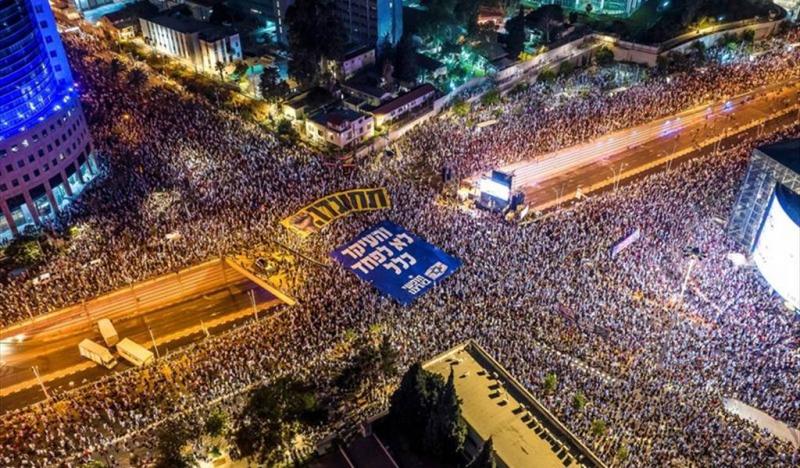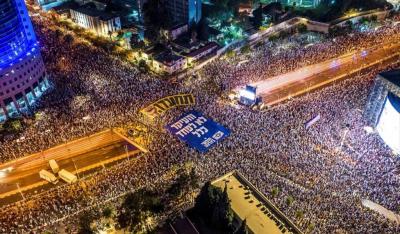As the crisis in Israel over judicial reforms reached its peak, opposing demonstrators faced each other at a subway station in Jerusalem. They ascended the escalators in differing groups, one heading to the parliament to protest, while the other moved towards Tel Aviv to participate in a rally supporting the government. Both sides carried the Israeli flag and banners advocating for democracy; however, for many Israelis, the polarization between the two factions has become clearer than ever. They see the approval of the first amendment on Monday, which limits the powers of the Supreme Court, as merely a superficial showcase, not the root cause of these deep divisions.
Those in favor of the judicial amendments are predominantly religious nationalists who helped bolster Prime Minister Benjamin Netanyahu's return to power in December through their growing numbers. For them, these amendments serve tangible issues, such as expanding settlements in the West Bank, securing exemptions from military service for students of religious Jewish institutions, and curbing what they view as judicial overreach into its authority and a drift towards a liberal culture. This stance places them at odds with Israelis depicted by opposition leader Yair Lapid as the productive middle class. This class has seen a decline in previously dominant center-left parties, with the number of their families falling below the birth rate of conservative factions.
Some of the protesters, shocked by the pace and scope of the judicial reforms, pledged not to pay taxes and to abstain from volunteering for reservist military service. "There will be no normal life in Israel. Netanyahu and his extremist government are pulling us into a rabbit hole," said 43-year-old university physics professor and protest organizer Shikma Breisler in an interview with Reuters.
Critics accuse Netanyahu of attempting to tear apart a highly sensitive social legal contract that Israel adopts as an alternative to a constitution in a state that categorizes itself as both Jewish and democratic. Many Israelis who support the government view the protests shaking Israel for the past seven months as an attempt to undermine their electoral victory. Aviya Cohen, a law student participating in the Tel Aviv demonstration, stated, "I am here today to show people that I voted ... I voted for those I support, and I completely support the judicial reforms."
Cohen accused the protesting reservists of attempting to carry out a "military coup." The idea of the election losers clinging to impose their influence has reignited class resentments within Netanyahu's Likud party, which first rose to power in the late 1970s with support from Jews marginalized due to their origins from countries in the Middle East. Foreign Minister Eli Cohen, born to Moroccan immigrants, told the Maariv daily that he believed someone with a similar background would be excluded from the Supreme Court because "belonging to a certain group is the only thing that qualifies you for that."
However, many polls indicate that the majority of Israelis harbor reservations about the proposed judicial reforms, which have harmed the economy and raised concerns among Western allies of Israel. Prominent opposition lawmaker Benny Gantz pointed out that Wednesday would mark the anniversary of the destruction of the Temple (Tisha B'Av), which is commemorated with fasting and mourning, a calamity often attributed by their sages to unjust internal sectarian conflict. Gantz told the parliament, "It is a sad day. On the eve of Tisha B'Av, we are on the brink of the abyss," but he pledged that his party would support the government when it comes to national security, regardless of the voting outcome.




